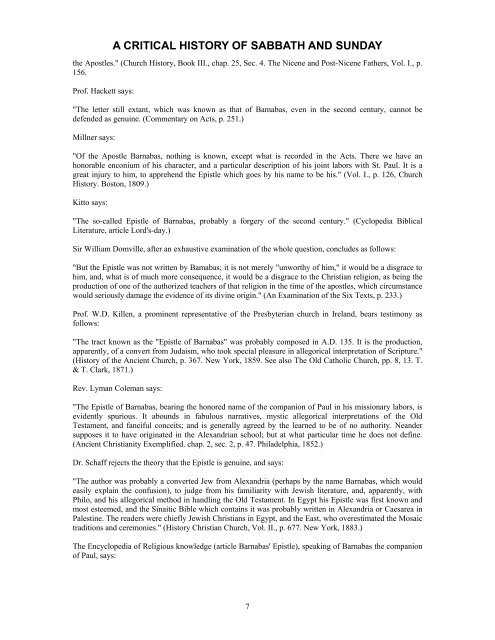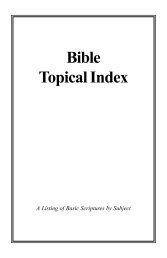a critical history of sabbath - Giving And Sharing
a critical history of sabbath - Giving And Sharing
a critical history of sabbath - Giving And Sharing
You also want an ePaper? Increase the reach of your titles
YUMPU automatically turns print PDFs into web optimized ePapers that Google loves.
A CRITICAL HISTORY OF SABBATH AND SUNDAY<br />
the Apostles." (Church History, Book III., chap. 25, Sec. 4. The Nicene and Post-Nicene Fathers, Vol. I., p.<br />
156.<br />
Pr<strong>of</strong>. Hackett says:<br />
"The letter still extant, which was known as that <strong>of</strong> Bamabas, even in the second century, cannot be<br />
defended as genuine. (Commentary on Acts, p. 251.)<br />
Millner says:<br />
"Of the Apostle Barnabas, nothing is known, except what is recorded in the Acts. There we have an<br />
honorable enconium <strong>of</strong> his character, and a particular description <strong>of</strong> his joint labors with St. Paul. It is a<br />
great injury to him, to apprehend the Epistle which goes by his name to be his." (Vol. I., p. 126, Church<br />
History. Boston, 1809.)<br />
Kitto says:<br />
"The so-called Epistle <strong>of</strong> Barnabas, probably a forgery <strong>of</strong> the second century." (Cyclopedia Biblical<br />
Literature, article Lord's-day.)<br />
Sir William Domville, after an exhaustive examination <strong>of</strong> the whole question, concludes as follows:<br />
"But the Epistle was not written by Bamabas; it is not merely "unworthy <strong>of</strong> him," it would be a disgrace to<br />
him, and, what is <strong>of</strong> much more consequence, it would be a disgrace to the Christian religion, as being the<br />
production <strong>of</strong> one <strong>of</strong> the authorized teachers <strong>of</strong> that religion in the time <strong>of</strong> the apostles, which circumstance<br />
would seriously damage the evidence <strong>of</strong> its divine origin." (An Examination <strong>of</strong> the Six Texts, p. 233.)<br />
Pr<strong>of</strong>. W.D. Killen, a prominent representative <strong>of</strong> the Presbyterian church in Ireland, bears testimony as<br />
follows:<br />
"The tract known as the "Epistle <strong>of</strong> Barnabas" was probably composed in A.D. 135. It is the production,<br />
apparently, <strong>of</strong> a convert from Judaism, who took special pleasure in allegorical interpretation <strong>of</strong> Scripture."<br />
(History <strong>of</strong> the Ancient Church, p. 367. New York, 1859. See also The Old Catholic Church, pp. 8, 13. T.<br />
& T. Clark, 1871.)<br />
Rev. Lyman Coleman says:<br />
"The Epistle <strong>of</strong> Barnabas, bearing the honored name <strong>of</strong> the companion <strong>of</strong> Paul in his missionary labors, is<br />
evidently spurious. It abounds in fabulous narratives, mystic allegorical interpretations <strong>of</strong> the Old<br />
Testament, and fanciful conceits; and is generally agreed by the learned to be <strong>of</strong> no authority. Neander<br />
supposes it to have originated in the Alexandrian school; but at what particular time he does not define.<br />
(Ancient Christianity Exemplified. chap. 2, sec. 2, p. 47. Philadelphia, 1852.)<br />
Dr. Schaff rejects the theory that the Epistle is genuine, and says:<br />
"The author was probably a converted Jew from Alexandria (perhaps by the name Barnabas, which would<br />
easily explain the confusion), to judge from his familiarity with Jewish literature, and, apparently, with<br />
Philo, and his allegorical method in handling the Old Testament. In Egypt his Epistle was first known and<br />
most esteemed, and the Sinaitic Bible which contains it was probably written in Alexandria or Caesarea in<br />
Palestine. The readers were chiefly Jewish Christians in Egypt, and the East, who overestimated the Mosaic<br />
traditions and ceremonies." (History Christian Church, Vol. II., p. 677. New York, 1883.)<br />
The Encyclopedia <strong>of</strong> Religious knowledge (article Barnabas' Epistle), speaking <strong>of</strong> Barnabas the companion<br />
<strong>of</strong> Paul, says:<br />
7



